medicinal mushroom blend
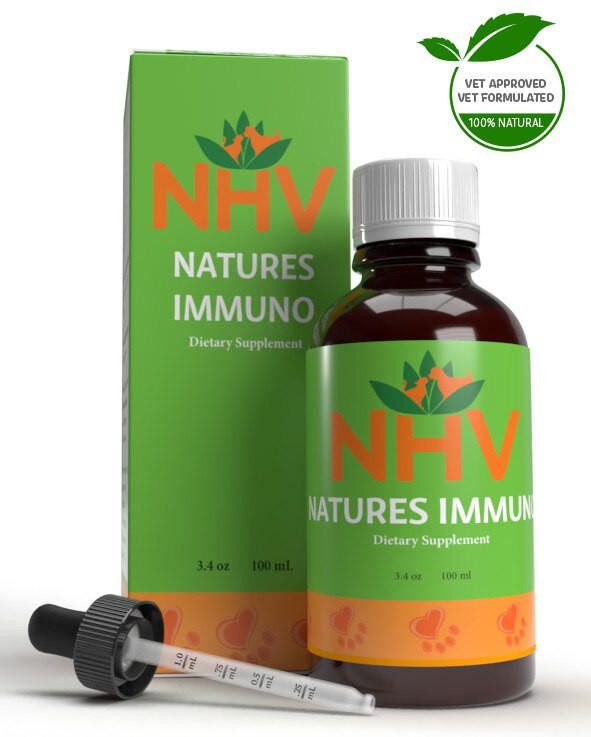
free shipping over $100 (USA & Canada)
1-877-937-4372 the pet expert hotline
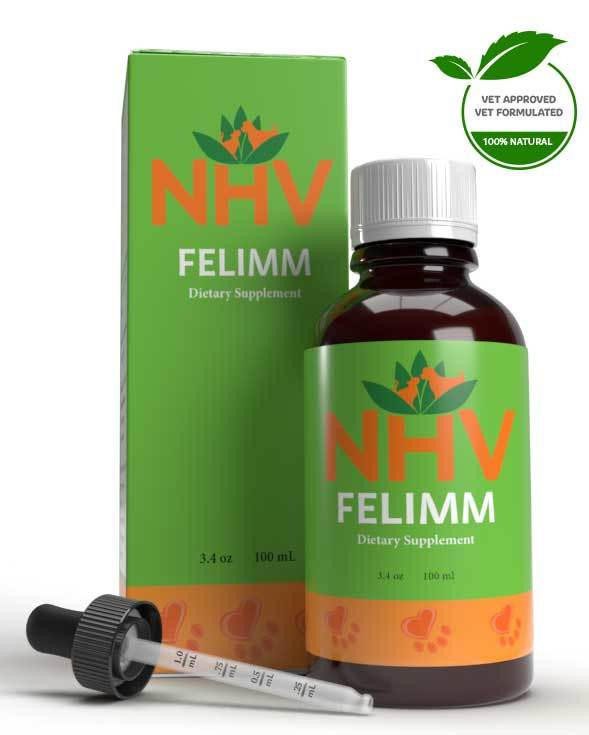
Helps your pet fight Feline Leukemia, FIV virus,other viral infections, and lymphoma

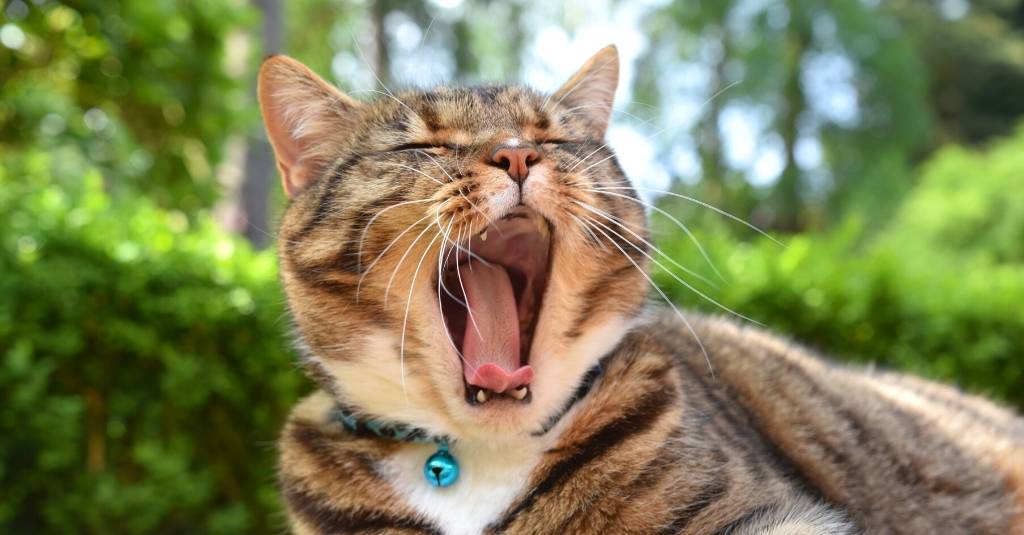
Feline panleukopenia virus is a species of parvovirus that can infect all wild and domestic members of the feline family worldwide. It is a highly contagious, severe infection that causes gastrointestinal, immune system, and nervous system disease.
Panleukopenia virus survives for a very long time and it has become resistant to various disinfectants.
Most people are familiar with canine parvovirus, feline panleukopenia is very similar to parvo in dogs. Both viruses are very closely related. It is a very common condition in unvaccinated kittens and roaming, outdoor cats. The problem with the feline Panleukopenia virus is that it survives for a very long time in the environment and it has become resistant to various disinfectants.
It is spread by direct contact with infected blood, feces, urine, and other bodily fluids and indirectly by contamination of inanimate objects that an infected cat may have been in contact with such as food bowls, brushes, bedding, etc. Infected cats can continue to shed the virus for up to 6 weeks after contracting it. It is very important for people handling infected cats to wash their hands after coming into contact with them and anything they may have used.
• Dehydration
• Vomiting
• Diarrhea
• Bloody Stools
• Weight loss
• Lethargy
• Fever
• Loss of Appetite
• Anemia
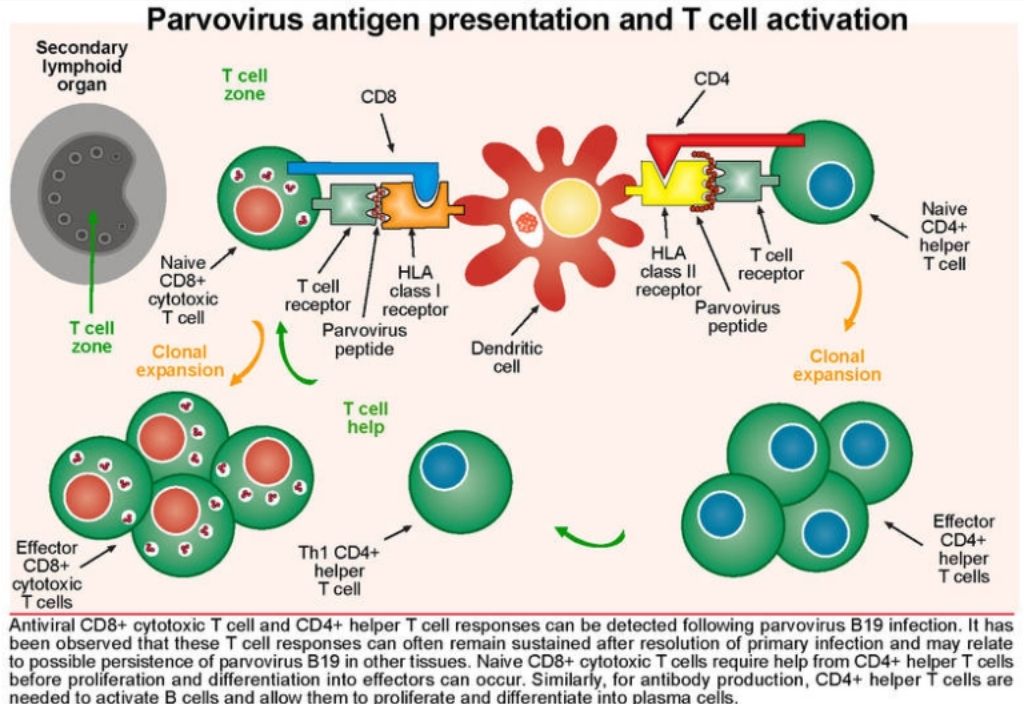
There are several tests that can be performed in order to test for panleukopenia. The most common ones are: first is the Complete Blood Count (CBC) and the second being the Enzyme-Linked Immunofluorescent Antibody (ELISA). Sometimes testing can return negative results even if it is infected, therefore it is very important to continue with testing and care of a very sick kitty. It is also best to still handle all things as if they are infected to prevent further transmission of Feline Panleukopenia.
The complete blood count or blood smear is a simple test performed by taking a blood sample and then smeared on a glass slide. A microscope is then used to count different blood cells. The biggest indication that a cat is infected, is a low count of white blood cells. White blood cells are part of the immune system and they help protect from an infection in the body, this is why panleukopenia cats are highly susceptible to infection.
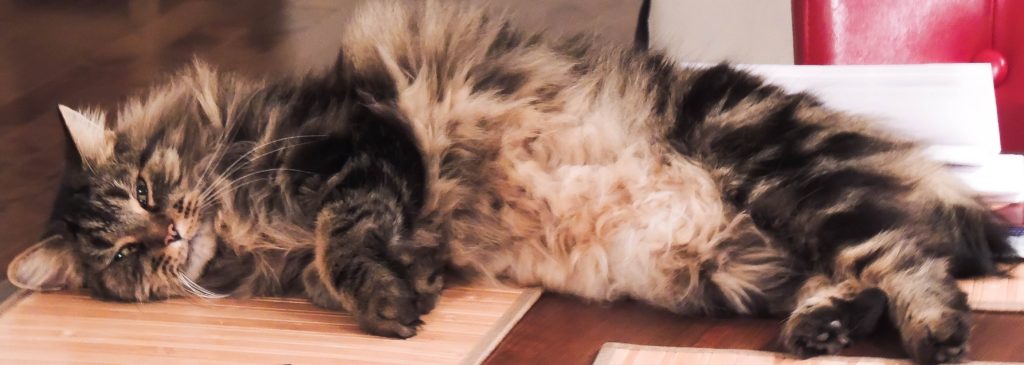
The best option for avoiding these diseases is to take any preventative measures that you can. First and foremost, vaccines are available in order to prevent your kitty from getting sick. Kittens generally require this vaccine between the age of 8 and 16 weeks. After the first year, a booster should be given and it is essential that you return with your fur kiddo one to three times a year for the vaccine, if missed they must be started again. If you are bringing another kitty into your family, then it is recommended that they are vaccinated prior to the introduction or kept quarantined.
Unfortunately, there is no cure for this, so most treatments are used to manage the symptoms while giving the immune system a chance to fight back. The infection is so severe that it usually requires hospitalization and IV fluids can be given to treat any dehydration. Antibiotics can be prescribed to treat secondary infections, but they will not kill the virus itself.
Cats living at home with the virus should be kept away from all other cats. As mentioned previously, the virus can shed in the environment for up to several weeks even after symptoms have cleared. Litterboxes must not be shared, and your kitty must be kept as an indoor cat.
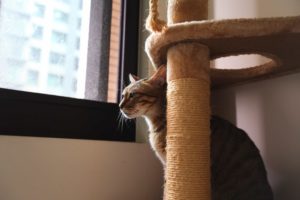
The main supplement that we would recommend would be Felimm, but others will also support a cat with parvovirus:
medicinal mushroom blend

Blend of medicinal mushrooms (turkey tails, cordyceps, reishi, shiitake, agaricus)
buy 2 and save $3
3 month supply for a small to medium size pet

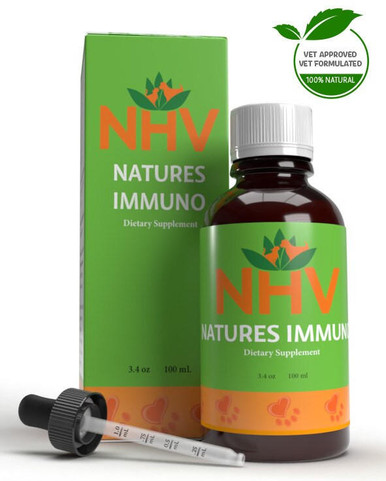

Medicinal mushroom blends are used by holistic and conventional veterinarians to help cats suffering from a variety of health conditions. Their immune supporting effects help with feline cancer, chronic feline infections, liver disorders, compromised immune systems, endocrine disorders, and kidney, respiratory, and cardiovascular problems.
Medicinal mushrooms are currently being researched and studied for their vast array of health benefits. NHV uses these mushrooms as a primary ingredient in supplements that support the immune system of cats.
The healing power of medicinal mushrooms has been known throughout Asia for thousands of years. The pharmacological potential of medicinal mushrooms is being extensively studied around the globe. Research is finding that specific medicinal mushrooms, like Turkey Tail mushrooms, may have the potential to help treat cancer, balance the immune system, and aid with digestive problems.
“The mounting evidence from various research groups across the globe, regarding anti-tumor application of mushroom extracts unarguably make it a fast-track research area worth mass attention.” – (Patel and Goyal, 2012)
The five well-researched mushrooms contained in our vet-formulated cat immune support supplement blend include:
Because this blend is in liquid form, it helps increase the bioavailability of the mushrooms, so your cat absorbs the medicine at a faster rate.
Use NHV’s holistic immune cancer support for cats with treatment prescribed by your vet for comprehensive care. You can always ask the experts at NHV where our pet experts are here to help answer questions, offer guidance and give support along the way.
Read more about cat immune support using the miracles of medicinal mushrooms on our blog because, at NHV, we care about your cat’s health naturally.
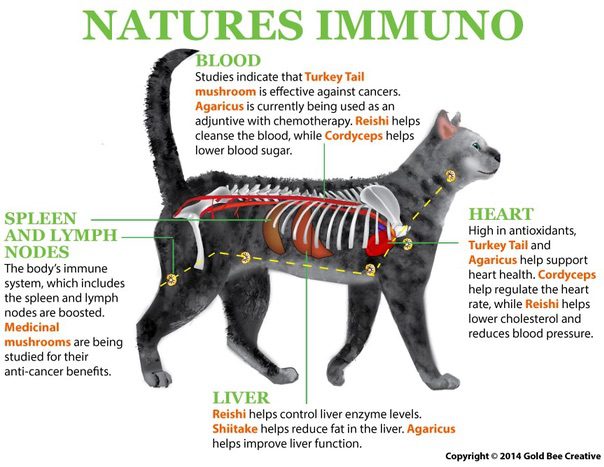
Turkey Tail mushroom has traditionally been used in Native American herbalism and in Chinese medicine to help improve immune function. It is a mushroom that has undergone a considerable resurgence in modern research for its health benefits. Studies have shown that it is beneficial for a wide variety of cancers, including mammary gland cancer and lymphoma. Researchers believe that Turkey Tail mushrooms contain properties that fight cancer while also helping to strengthen the immune system. It has antioxidant, anticarcinogenic, immune-modulating, anti-inflammatory, and cardioprotective properties.
Cordyceps mushroom is rich in phytonutrients and contains polysaccharides, which help with antioxidant properties. Research has indicated that cordyceps have anti-tumor, immune stimulating and hypoglycemic activity. They are beneficial for diabetes as they help lower blood sugar. Cordyceps are also beneficial for heart health, liver and kidney health.
Reishi mushroom has been used for thousands of years in traditional Chinese Medicine. Current research indicates that reishi mushrooms are helpful in supporting the immune and cardiovascular systems, as well as helping to increase oxygenation of the blood. Reishi is effective against sarcoma and tumor necrosis. Reishi is currently being used in Japan and China in conjunction with chemotherapy drugs.
Shiitake mushroom has been used for thousands of years in herbalism, and is also a popular cooking ingredient. Research indicates that Shiitake has strong antibiotic and antibacterial properties against a broad spectrum of pathogens. In addition to its potential cancer-fighting properties, it is useful in supporting heart health as it lowers cholesterol and helps lessen plaque in the arteries.
Agaricus mushroom is studied for their usefulness in preventing cancer cell production. Agaricus is considered an antimutagenic and an adaptogen, which helps combat stress and supports endocrine function. It is useful for pets with autoimmune conditions, digestive issues, and heart problems. Agaricus is being used in Japan as an adjunctive with chemotherapy treatments.
Select your pet's weight to determine the correct dose.
To be taken twice daily.
Determine your pet’s weight and then use the easy chart below to determine the correct dose. You can safely double the recommended dosage.
Pet's Weight Dosage
0 - 15 lb 0.5 mL
16 - 30 lb 1.0 mL
31 - 45 lb 1.5 mL
46 - 60 lb 2.0 mL
61 - 75 lb 2.5 mL
Over 75 lb 3.0 mL
How to Administer
Shake well before use. The easiest method is to use the dropper provided and place the drops into your pet’s food or favorite treat. You can also use the dropper and squirt directly into the pet’s mouth. Some pets can be finicky, if this occurs consider hiding the drops in foods most pet’s love such as fish, chicken, yogurt, or a favorite treat. If your pet only eats dry food then soak a few kibbles at feeding time.
For Best Results
Herbal dietary supplements are beneficial to the health and well-being of your pet and are safe for long-term use. Every pet responds to natural herbal supplements differently, therefore it is important to be consistent and administer the product daily. Supplements generally take two to four weeks to take effect, however this will vary from one animal to the next.
Product Storage
All NHV Natural Pet Products are pure herbal extracts and contain no artificial additives, preservatives or coloring. Shelf life after opening is 6 months and must be refrigerated after opening.
Medicinal mushroom blends are used by holistic and conventional veterinarians to help cats suffering from a variety of health conditions. Their immune supporting effects help with feline cancer, chronic feline infections, liver disorders, compromised immune systems, endocrine disorders, and kidney, respiratory, and cardiovascular problems.
Medicinal mushrooms are currently being researched and studied for their vast array of health benefits. NHV uses these mushrooms as a primary ingredient in supplements that support the immune system of cats.
The healing power of medicinal mushrooms has been known throughout Asia for thousands of years. The pharmacological potential of medicinal mushrooms is being extensively studied around the globe. Research is finding that specific medicinal mushrooms, like Turkey Tail mushrooms, may have the potential to help treat cancer, balance the immune system, and aid with digestive problems.
“The mounting evidence from various research groups across the globe, regarding anti-tumor application of mushroom extracts unarguably make it a fast-track research area worth mass attention.” – (Patel and Goyal, 2012)
The five well-researched mushrooms contained in our vet-formulated cat immune support supplement blend include:
Because this blend is in liquid form, it helps increase the bioavailability of the mushrooms, so your cat absorbs the medicine at a faster rate.
Use NHV’s holistic immune cancer support for cats with treatment prescribed by your vet for comprehensive care. You can always ask the experts at NHV where our pet experts are here to help answer questions, offer guidance and give support along the way.
Read more about cat immune support using the miracles of medicinal mushrooms on our blog because, at NHV, we care about your cat’s health naturally.

Turkey Tail mushroom has traditionally been used in Native American herbalism and in Chinese medicine to help improve immune function. It is a mushroom that has undergone a considerable resurgence in modern research for its health benefits. Studies have shown that it is beneficial for a wide variety of cancers, including mammary gland cancer and lymphoma. Researchers believe that Turkey Tail mushrooms contain properties that fight cancer while also helping to strengthen the immune system. It has antioxidant, anticarcinogenic, immune-modulating, anti-inflammatory, and cardioprotective properties.
Cordyceps mushroom is rich in phytonutrients and contains polysaccharides, which help with antioxidant properties. Research has indicated that cordyceps have anti-tumor, immune stimulating and hypoglycemic activity. They are beneficial for diabetes as they help lower blood sugar. Cordyceps are also beneficial for heart health, liver and kidney health.
Reishi mushroom has been used for thousands of years in traditional Chinese Medicine. Current research indicates that reishi mushrooms are helpful in supporting the immune and cardiovascular systems, as well as helping to increase oxygenation of the blood. Reishi is effective against sarcoma and tumor necrosis. Reishi is currently being used in Japan and China in conjunction with chemotherapy drugs.
Shiitake mushroom has been used for thousands of years in herbalism, and is also a popular cooking ingredient. Research indicates that Shiitake has strong antibiotic and antibacterial properties against a broad spectrum of pathogens. In addition to its potential cancer-fighting properties, it is useful in supporting heart health as it lowers cholesterol and helps lessen plaque in the arteries.
Agaricus mushroom is studied for their usefulness in preventing cancer cell production. Agaricus is considered an antimutagenic and an adaptogen, which helps combat stress and supports endocrine function. It is useful for pets with autoimmune conditions, digestive issues, and heart problems. Agaricus is being used in Japan as an adjunctive with chemotherapy treatments.
Select your pet's weight to determine the correct dose.
To be taken twice daily.
Determine your pet’s weight and then use the easy chart below to determine the correct dose. You can safely double the recommended dosage.
Pet's Weight Dosage
0 - 15 lb 0.5 mL
16 - 30 lb 1.0 mL
31 - 45 lb 1.5 mL
46 - 60 lb 2.0 mL
61 - 75 lb 2.5 mL
Over 75 lb 3.0 mL
How to Administer
Shake well before use. The easiest method is to use the dropper provided and place the drops into your pet’s food or favorite treat. You can also use the dropper and squirt directly into the pet’s mouth. Some pets can be finicky, if this occurs consider hiding the drops in foods most pet’s love such as fish, chicken, yogurt, or a favorite treat. If your pet only eats dry food then soak a few kibbles at feeding time.
For Best Results
Herbal dietary supplements are beneficial to the health and well-being of your pet and are safe for long-term use. Every pet responds to natural herbal supplements differently, therefore it is important to be consistent and administer the product daily. Supplements generally take two to four weeks to take effect, however this will vary from one animal to the next.
Product Storage
All NHV Natural Pet Products are pure herbal extracts and contain no artificial additives, preservatives or coloring. Shelf life after opening is 6 months and must be refrigerated after opening.
discomfort support

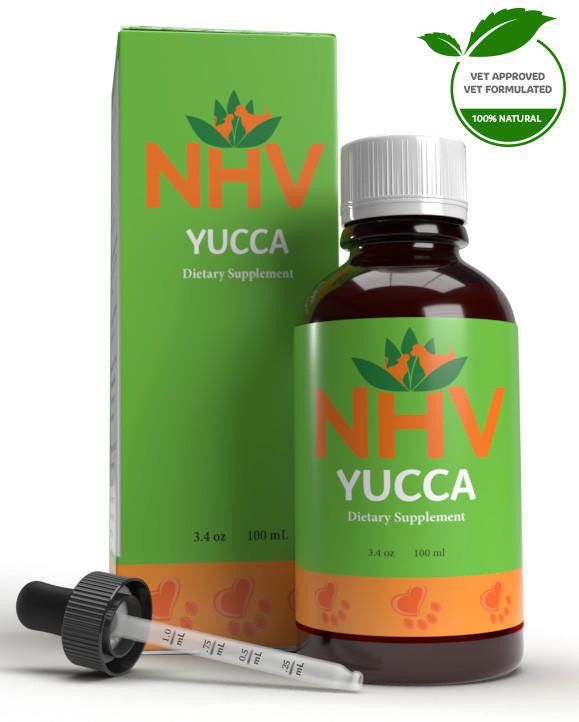
Support for Discomfort and Appetite Stimulant
buy 2 and save $3
3 month supply for a small to medium size
NHV Yucca is used for cats as a supplement to provide nutrients, and may be helpful for discomfort, inflammation, and to increase or balance the appetite.


NHV Yucca is used for cats as a supplement to provide nutrients, and may be helpful for discomfort, inflammation, and to increase or balance the appetite.

Yucca is used in cat food as well as food for other animals around the world. Its root is a highly nutritious herb that’s rich in vitamin C, beta-carotene, B vitamins, magnesium, iron, calcium, manganese, protein, niacin, and phosphorus.
Yucca contains two very beneficial compounds: sarsasapogenin and smilagenin. These two compounds work on the mucous membranes of the small intestine. These compounds help with the penetration and absorption of minerals and vitamins. Sarsasapogenin and smilagenin are known as steroidal saponins (phytosterols) which act as precursors to corticosteroids produced naturally by the body.
Steroidal saponins support the immune function of the body while stimulating and supporting the production of its own corticosteroids and corticosteroid–related hormones. Due to this action, studies conducted on Yucca have shown that it may be beneficial and effective for discomfort relief and inflammation in conditions such as arthritis. Yucca for cats may also be a natural appetite stimulant and may also help reduce the production of urease, which contributes to the unpleasant odors of urine and feces in some cats.
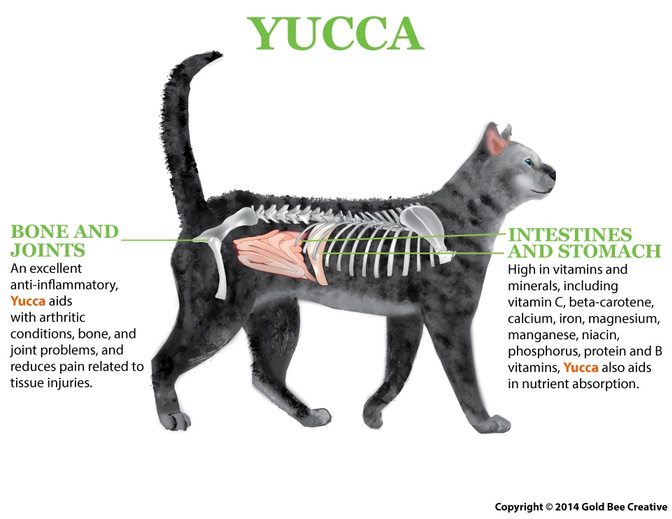
Yucca - Commonly used for supporting arthritis, as an anti-inflammatory, nutritive, antitumor, and digestive supplement.

Select your pet's weight to determine the correct dose.
To be taken twice daily. Determine your pet’s weight and then use the easy chart below to determine the correct dose. This is the minimum dosage.
Pet's Weight Dosage
0 - 15 lb = 0.5 ml
16 - 30 lb = 1.0 ml
31 - 45 lb = 1.5 ml
46 - 60 lb = 2.0 ml
61 - 75 lb = 2.5 ml
Over 75 lb = 3.0 ml
How to Administer: Shake well before use. The easiest method is to use the dropper provided and place the drops into your pet’s food or favorite treat. You can also use the dropper and squirt directly into the pet’s mouth. Some pets can be finicky, if this occurs consider hiding the drops in foods most pet’s love such as fish, chicken, yogurt, or a favorite treat. If your pet only eats dry food then soak a few kibbles at feeding time.
For Best Results: Herbal dietary supplements are beneficial to the health and well-being of your pet and are safe for long-term use. Every pet responds to natural herbal supplements differently, therefore it is important to be consistent and administer the product daily. Supplements generally take two to four weeks to take effect, however this will vary from one animal to the next.
Product Storage:
All NHV Natural Pet Products are pure herbal extracts and contain no artificial additives, preservatives or coloring. Shelf life after opening is 6 months and must be refrigerated after opening.
Cautions and Contraindications
Do not use Yucca in pregnant or nursing animals.
Speak to your vet before using our products. A second visit is recommended if your pet’s condition does not improve, or deteriorates after continued use of the supplements. All information provided by NHV Natural Pet Products is for educational purposes only.
Yucca is used in cat food as well as food for other animals around the world. Its root is a highly nutritious herb that’s rich in vitamin C, beta-carotene, B vitamins, magnesium, iron, calcium, manganese, protein, niacin, and phosphorus.
Yucca contains two very beneficial compounds: sarsasapogenin and smilagenin. These two compounds work on the mucous membranes of the small intestine. These compounds help with the penetration and absorption of minerals and vitamins. Sarsasapogenin and smilagenin are known as steroidal saponins (phytosterols) which act as precursors to corticosteroids produced naturally by the body.
Steroidal saponins support the immune function of the body while stimulating and supporting the production of its own corticosteroids and corticosteroid–related hormones. Due to this action, studies conducted on Yucca have shown that it may be beneficial and effective for discomfort relief and inflammation in conditions such as arthritis. Yucca for cats may also be a natural appetite stimulant and may also help reduce the production of urease, which contributes to the unpleasant odors of urine and feces in some cats.

Yucca - Commonly used for supporting arthritis, as an anti-inflammatory, nutritive, antitumor, and digestive supplement.

Select your pet's weight to determine the correct dose.
To be taken twice daily. Determine your pet’s weight and then use the easy chart below to determine the correct dose. This is the minimum dosage.
Pet's Weight Dosage
0 - 15 lb = 0.5 ml
16 - 30 lb = 1.0 ml
31 - 45 lb = 1.5 ml
46 - 60 lb = 2.0 ml
61 - 75 lb = 2.5 ml
Over 75 lb = 3.0 ml
How to Administer: Shake well before use. The easiest method is to use the dropper provided and place the drops into your pet’s food or favorite treat. You can also use the dropper and squirt directly into the pet’s mouth. Some pets can be finicky, if this occurs consider hiding the drops in foods most pet’s love such as fish, chicken, yogurt, or a favorite treat. If your pet only eats dry food then soak a few kibbles at feeding time.
For Best Results: Herbal dietary supplements are beneficial to the health and well-being of your pet and are safe for long-term use. Every pet responds to natural herbal supplements differently, therefore it is important to be consistent and administer the product daily. Supplements generally take two to four weeks to take effect, however this will vary from one animal to the next.
Product Storage:
All NHV Natural Pet Products are pure herbal extracts and contain no artificial additives, preservatives or coloring. Shelf life after opening is 6 months and must be refrigerated after opening.
Cautions and Contraindications
Do not use Yucca in pregnant or nursing animals.
Speak to your vet before using our products. A second visit is recommended if your pet’s condition does not improve, or deteriorates after continued use of the supplements. All information provided by NHV Natural Pet Products is for educational purposes only.
immune support
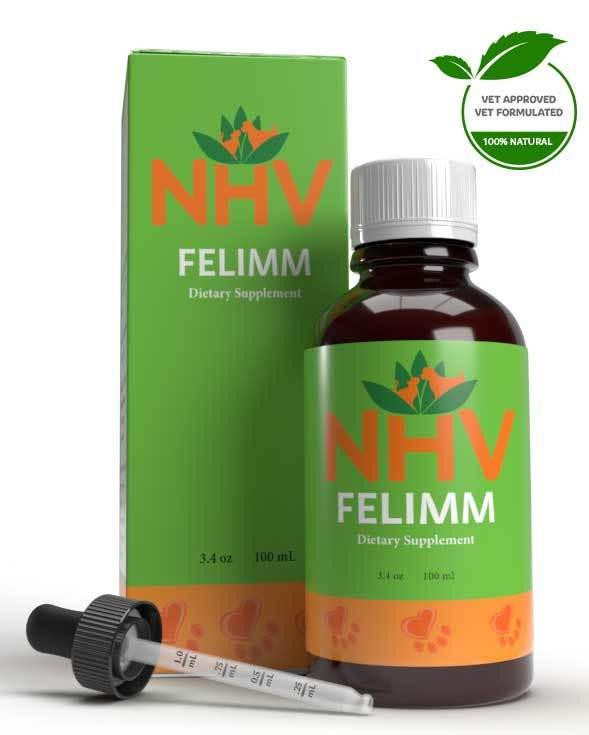
100% Natural herbal supplement that helps your sheep or goat fight a wide range of viral, fungal and bacterial related infections.
buy 2 and save $3
3 month supply for a small to medium size pet.
Natural, vet formulated herbal support can help sheep and goats fight bacterial, viral and fungal infections such as Caprine Arthritis Encephalitis or Caseous Lymphadenitis.

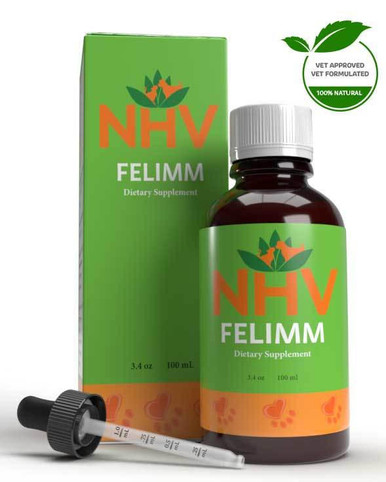
Natural, vet formulated herbal support can help sheep and goats fight bacterial, viral and fungal infections such as Caprine Arthritis Encephalitis or Caseous Lymphadenitis.

NHV Felimm can help pets suffering from viral, fungal or bacterial infections.
Viruses, as well as fungal and bacterial infections can harm your pet’s immune systems as well as affect the function of other organs. Felimm is also an excellent support for pets fighting lymphoma
To help your pet heal, it is important to help the organs effected, improve immune function and help the body fight off the infection. NHV Felimm contains a variety of potent herbs that help support and defend the body against viral, fungal and bacterial infections while boosting the immune and detoxifying the lymph nodes.
St. John’s Wort – A herb know to have strong antiviral, immunostimulant, anti-inflammatory, antiretroviral and antibacterial properties. St. John’s wort has a history of being used to help the body fight the herpes virus, as well as viral hepatitis and HIV. It helps with inhibiting the reproduction of the viruses, and has been shown to be beneficial for canine distemper.
Turmeric – A very powerful antioxidant that helps combat the damaging effects of free radicals. It strengthens liver function and contains strong anti-fungal properties.
Aloe Vera – Helps control fungal infections, and helps improve white blood cell counts which helps destroy infectious organisms. An herb that is known for its immuno-stimulating, antibacterial, antitumor and anti-inflammatory properties.
Alfalfa – A extremely nutritious herb that is high in minerals, amino acids, a good source of chlorophyll and high in antioxidants.
Burdock – Is a herb and a food that is very nutritive as it contains high levels of minerals such as iron and calcium. Strong antiviral properties that support liver, gallbladder, and help clean and improve blood quality. It helps remove toxins that accumulate during illness and helps scavenge free radicals form a dog’s body.
Cat’s Claw – has traditionally been used in herbal medicine to treat the herpes virus and other viral related infections due to various properties, which help boost the immune system while fighting off infections and inflammation.
Osha – a herb used for centuries to help fight viral infections that affect the respiratory system. It helps to relieve inflammation of the bronchial tube, relax the muscles and stops bacteria and virtues from spreading. A natural immune builder that helps dogs fight infections and helps improve immune function.
Dandelion – A highly nutritious food that stimulates liver secretion, protects the kidneys improves digestion and stimulates appetite. It helps provide a pet’s body with vitamins and minerals that is needed when fighting an infection. It is known to help reduce inflammation in the body.
Gotu Kola – An antioxidant-rich herb known to strengthen the immune system and protect cells from damage caused by free radicals. It helps calm the nervous system, which helps reduce added stress canines exhibit when fighting infections. It is also use to help with respiratory issues.
Usnea – An immune system stimulant with anti-bacterial and anti-fungal properties that helps protect a dogs weakened immune system from infections respiratory and sinus infections, bronchial issues, Canine influenza and herpes virus. It helps boost and restore proper immune function.
Goldenseal – A herb known for improving immune function. It helps eliminate toxins from the blood. It has strong fungal fighting properties and is used when dealing with Candida and thrush in dogs.
Myrrh – a medicinal herb that dates back to 1550 BC. Considered to be a natural antibiotic, antiviral and astringent herb. It strengthens and improves the immune system and helps fight infections.
Determine your pet’s weight and then use the easy chart below to determine the correct dose. This is the minimum dosage.
Pet's Weight Dosage
0 - 15 lb = 0.5 ml
16 - 30 lb = 1.0 ml
31 - 45 lb = 1.5 ml
46 - 60 lb = 2.0 ml
61 - 75 lb = 2.5 ml
Over 75 lb = 3.0 ml
How to Administer
Shake well before use. The easiest method is to use the dropper provided and place the drops into your pet’s food or favorite treat. You can also use the dropper and squirt directly into the pet’s mouth. Some pets can be finicky, if this occurs consider hiding the drops in foods most pet’s love such as fish, chicken or yogurt or a favorite treat. If your pet only eats dry food then soak a few kibbles at feeding time.
For Best Results
Herbal dietary supplements are beneficial to the health and well-being of your pet and are safe for long-term use. Every pet responds to natural herbal supplements differently, therefore it is important to be consistent and administer the product daily. Supplements generally take two to four weeks to take effect, however this will vary from one animal to the next.
Product Storage
All NHV Natural Pet Products are pure herbal extracts and contain no artificial additives, preservatives or coloring. Shelf life after opening is 6 months and must be refrigerated after opening.
Cautions and Contraindications
Do not use Felimm in pregnant or nursing animals. Speak to your vet before using our products. A second visit is recommended if your pet’s condition does not improve, or deteriorates after continued use of the supplements.
All information provided by NHV Natural Pet Products is for educational purposes only.
NHV Felimm can help pets suffering from viral, fungal or bacterial infections.
Viruses, as well as fungal and bacterial infections can harm your pet’s immune systems as well as affect the function of other organs. Felimm is also an excellent support for pets fighting lymphoma
To help your pet heal, it is important to help the organs effected, improve immune function and help the body fight off the infection. NHV Felimm contains a variety of potent herbs that help support and defend the body against viral, fungal and bacterial infections while boosting the immune and detoxifying the lymph nodes.
St. John’s Wort – A herb know to have strong antiviral, immunostimulant, anti-inflammatory, antiretroviral and antibacterial properties. St. John’s wort has a history of being used to help the body fight the herpes virus, as well as viral hepatitis and HIV. It helps with inhibiting the reproduction of the viruses, and has been shown to be beneficial for canine distemper.
Turmeric – A very powerful antioxidant that helps combat the damaging effects of free radicals. It strengthens liver function and contains strong anti-fungal properties.
Aloe Vera – Helps control fungal infections, and helps improve white blood cell counts which helps destroy infectious organisms. An herb that is known for its immuno-stimulating, antibacterial, antitumor and anti-inflammatory properties.
Alfalfa – A extremely nutritious herb that is high in minerals, amino acids, a good source of chlorophyll and high in antioxidants.
Burdock – Is a herb and a food that is very nutritive as it contains high levels of minerals such as iron and calcium. Strong antiviral properties that support liver, gallbladder, and help clean and improve blood quality. It helps remove toxins that accumulate during illness and helps scavenge free radicals form a dog’s body.
Cat’s Claw – has traditionally been used in herbal medicine to treat the herpes virus and other viral related infections due to various properties, which help boost the immune system while fighting off infections and inflammation.
Osha – a herb used for centuries to help fight viral infections that affect the respiratory system. It helps to relieve inflammation of the bronchial tube, relax the muscles and stops bacteria and virtues from spreading. A natural immune builder that helps dogs fight infections and helps improve immune function.
Dandelion – A highly nutritious food that stimulates liver secretion, protects the kidneys improves digestion and stimulates appetite. It helps provide a pet’s body with vitamins and minerals that is needed when fighting an infection. It is known to help reduce inflammation in the body.
Gotu Kola – An antioxidant-rich herb known to strengthen the immune system and protect cells from damage caused by free radicals. It helps calm the nervous system, which helps reduce added stress canines exhibit when fighting infections. It is also use to help with respiratory issues.
Usnea – An immune system stimulant with anti-bacterial and anti-fungal properties that helps protect a dogs weakened immune system from infections respiratory and sinus infections, bronchial issues, Canine influenza and herpes virus. It helps boost and restore proper immune function.
Goldenseal – A herb known for improving immune function. It helps eliminate toxins from the blood. It has strong fungal fighting properties and is used when dealing with Candida and thrush in dogs.
Myrrh – a medicinal herb that dates back to 1550 BC. Considered to be a natural antibiotic, antiviral and astringent herb. It strengthens and improves the immune system and helps fight infections.
Determine your pet’s weight and then use the easy chart below to determine the correct dose. This is the minimum dosage.
Pet's Weight Dosage
0 - 15 lb = 0.5 ml
16 - 30 lb = 1.0 ml
31 - 45 lb = 1.5 ml
46 - 60 lb = 2.0 ml
61 - 75 lb = 2.5 ml
Over 75 lb = 3.0 ml
How to Administer
Shake well before use. The easiest method is to use the dropper provided and place the drops into your pet’s food or favorite treat. You can also use the dropper and squirt directly into the pet’s mouth. Some pets can be finicky, if this occurs consider hiding the drops in foods most pet’s love such as fish, chicken or yogurt or a favorite treat. If your pet only eats dry food then soak a few kibbles at feeding time.
For Best Results
Herbal dietary supplements are beneficial to the health and well-being of your pet and are safe for long-term use. Every pet responds to natural herbal supplements differently, therefore it is important to be consistent and administer the product daily. Supplements generally take two to four weeks to take effect, however this will vary from one animal to the next.
Product Storage
All NHV Natural Pet Products are pure herbal extracts and contain no artificial additives, preservatives or coloring. Shelf life after opening is 6 months and must be refrigerated after opening.
Cautions and Contraindications
Do not use Felimm in pregnant or nursing animals. Speak to your vet before using our products. A second visit is recommended if your pet’s condition does not improve, or deteriorates after continued use of the supplements.
All information provided by NHV Natural Pet Products is for educational purposes only.
Published: January 17, 2020